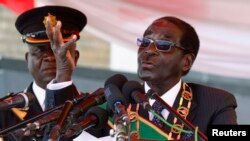Much progress has been made in Zimbabwe since the country’s 2008 economic collapse. Under the multi-party unity government, important public services such as health care, education and sanitation began to recover, thanks to development aid from the United States and other Western donors.
With the introduction of the multi-currency regime, the nation's chronic hyper-inflation ended. Senior leaders of the ZANU-PF and Movement for Democratic Change parties met to discuss national policies aimed at serving the interests of Zimbabwe’s people.
The unity government ended in July, though, and President Mugabe now faces a significant challenge: he must move Zimbabwe’s economy along the path to recovery by putting in place sound economic policies.
The United States and the international community remain committed to the Zimbabwean people, but we will maintain a firm stance against those who would retain power and wealth at all costs, and at the people's expense.
Following the flawed July 31st presidential and parliamentary elections, Zimbabwe's ruling ZANU-PF party has increased its criticism of actions taken by the international community against top Zimbabwean officials and their key supporters, men who have undermined democracy and hindered the progress of a nation that was once one of Africa's leading economies. Though targeted against a select few, these limited measures are falsely blamed for many of the country's continuing economic challenges.
Targeted sanctions by the United States, the United Kingdom, European Union, and others are not behind Zimbabwe's economic and political difficulties. These actions consist of travel bans and asset freezes on President Mugabe and other senior military and political figures closely associated with them, as well as some of their close family members. Business interests that have been particularly exploitative are also targeted. In the future, new names may be added to the list or others removed, as conditions warrant.
We will not be swayed by attempts to blame others for the actions of these individuals and entities. Nor will we falter in our support for the Zimbabwean people. The United States and our partners have provided hundreds of millions of dollars in health, food, agricultural, and small business assistance there, and that aid will continue. We are also prepared to respond to the possible humanitarian costs of a return to old policies that undermined Zimbabwe’s economy before the unity government.
Zimbabwe's human and economic potential is enormous. The United States remains dedicated to helping the people of Zimbabwe achieve the democratic, peaceful and prosperous future they deserve.
With the introduction of the multi-currency regime, the nation's chronic hyper-inflation ended. Senior leaders of the ZANU-PF and Movement for Democratic Change parties met to discuss national policies aimed at serving the interests of Zimbabwe’s people.
The unity government ended in July, though, and President Mugabe now faces a significant challenge: he must move Zimbabwe’s economy along the path to recovery by putting in place sound economic policies.
The United States and the international community remain committed to the Zimbabwean people, but we will maintain a firm stance against those who would retain power and wealth at all costs, and at the people's expense.
Following the flawed July 31st presidential and parliamentary elections, Zimbabwe's ruling ZANU-PF party has increased its criticism of actions taken by the international community against top Zimbabwean officials and their key supporters, men who have undermined democracy and hindered the progress of a nation that was once one of Africa's leading economies. Though targeted against a select few, these limited measures are falsely blamed for many of the country's continuing economic challenges.
Targeted sanctions by the United States, the United Kingdom, European Union, and others are not behind Zimbabwe's economic and political difficulties. These actions consist of travel bans and asset freezes on President Mugabe and other senior military and political figures closely associated with them, as well as some of their close family members. Business interests that have been particularly exploitative are also targeted. In the future, new names may be added to the list or others removed, as conditions warrant.
We will not be swayed by attempts to blame others for the actions of these individuals and entities. Nor will we falter in our support for the Zimbabwean people. The United States and our partners have provided hundreds of millions of dollars in health, food, agricultural, and small business assistance there, and that aid will continue. We are also prepared to respond to the possible humanitarian costs of a return to old policies that undermined Zimbabwe’s economy before the unity government.
Zimbabwe's human and economic potential is enormous. The United States remains dedicated to helping the people of Zimbabwe achieve the democratic, peaceful and prosperous future they deserve.




